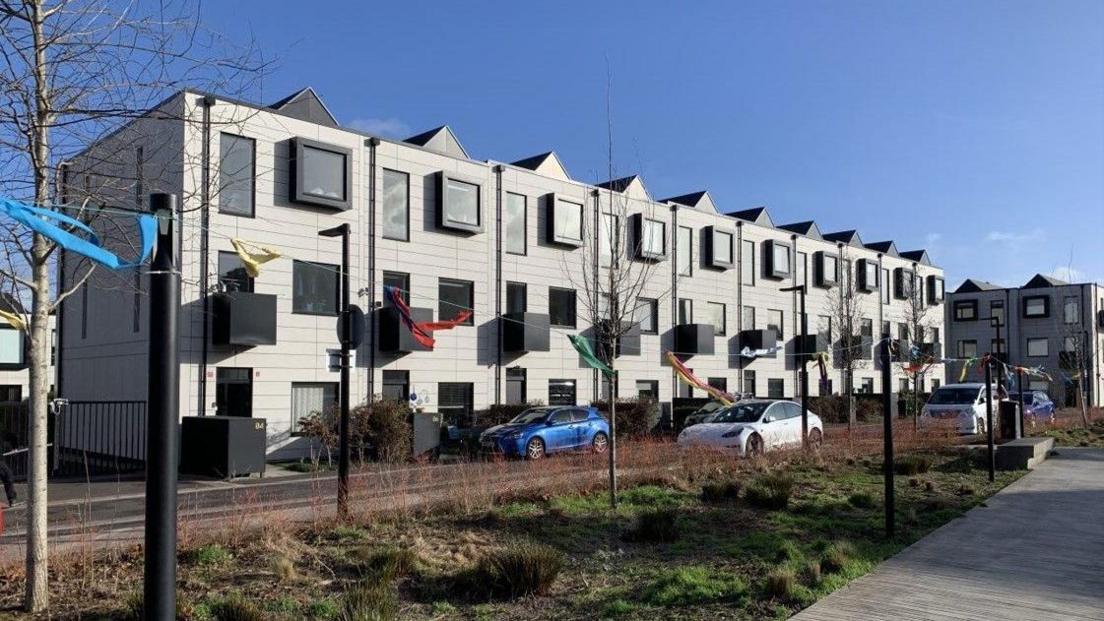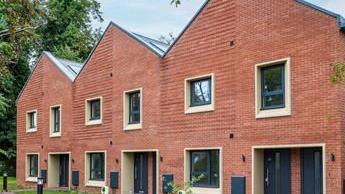Energy targets 'unaffordable' - social landlord

WMCA wants to ensure that homes built from 2025 do even better than energy efficiency guidelines laid down by Government
- Published
One of the West Midlands’ largest social housing landlords has warned that new energy efficiency targets for the delivery of thousands of new homes could become unaffordable for developers.
Midland Heart, which manages 34,000 homes, is assessing a bid for a share of £200m of Government funding, described as a housing “war chest” by the region's overarching council, West Midlands Combined Authority (WMCA).
WMCA wants developers to try to deliver housing schemes "above and beyond" the Government’s own Future Homes Standard, the guidelines monitoring carbon levels.
But the boss of Midland Heart has said the approach could undermine the wider housebuilding strategy by making projects unaffordable for developers to realise - concern echoed within the industry, with one expert saying it risks "a great disservice to the people of the West Midlands".
WMCA leader, mayor Andy Street, said he recognised the points but stressed fuel poverty across the region meant the authority had to act.
Meanwhile, the WMCA has said it is on track to address the region's housing needs by way of 215,000 new homes by 2031 with a "brownfield first" policy.
That programme has to be carried out in line with the Future Homes Standard which requires homes built from 2025 to produce 75 to 80% less carbon than property built under current regulations. Additionally, a minimum of 20% of newbuild dwellings must be affordable homes.
According to Midlands Heart's executive director Joe Reeves "those standards are going to be very difficult to achieve".
“It’s likely these homes will cost more to build," he said.
“What we need to do is work together with the Government and combined authority… to bring as much resource into place so we have the opportunity to build the homes so desperately required.”
Alongside the view comes criticism from the region’s building industry over the increasing use of factory-built or modular homes to meet energy targets.

Mayor Andy Street said he was aware of criticism in the building sector but fuel poverty meant the WMCA had to act on energy targets
The Building Alliance ha said it could punish local construction firms if "traditional" housebuilding skills such as bricklaying are ditched in favour of factory builds that are lifted on to a site.
“I think the WMCA is doing a grave disservice to the people of the West Midlands”, warned Mike Leonard, chief executive of the group.
“Setting energy targets at this level presents a cost base that is unaffordable, and if that reduces the number of homes for those who desperately need them, then it’s wrong. There is no doubt this policy has been written to favour the introduction of modular homes.”
Andy Street said he understood the debate – and that public consultation was under way - but he added fuel poverty across the region meant energy bills had to be brought down.
“It’s all about young people being able to buy their own home or rent at an affordable price – that’s how the target is worked out," Mr Street said.
“We can move the market on… we are ambitious. The Future Homes Standard is good but we want to get an even bigger reduction in bills for householders."

Midland Heart is warning new energy efficiency targets could be unaffordable for developers
There are an estimated 235,512 fuel-poor homes in the West Midlands – and at 17.5%, that is the highest rate of fuel poverty in any English region.
Midland Heart has a number of new developments, including the experimental "Project 80" in Birmingham – a series of maisonettes on Elvetham Road already meeting the Future Homes Standard via sustainable building materials, air heat pumps and solar panels.
The provider hopes to build 4,000 new homes over the next two years.
“The region needs to have homes that are better insulated to reduce fuel bills and improve energy performance. I think they need to be better ventilated to reduce damp and mould," said Mr Reeves.
“We’d have to deliver more exacting standards and therefore to have subsidised housing - realistically - we’d probably need to ask for more grant funding."
Housing associations and developers are continuing to operate against a backdrop of high inflation and rising costs of raw materials.
But Government figures show that in the 12 months to March 2023, 15,690 new homes were built in the area covered by West Midlands Combined Authority.
Follow BBC West Midlands on Facebook, external, X, external, and Instagram, external. Send your story ideas to: newsonline.westmidlands@bbc.co.uk, external
Related topics
Related stories
- Published5 October 2011